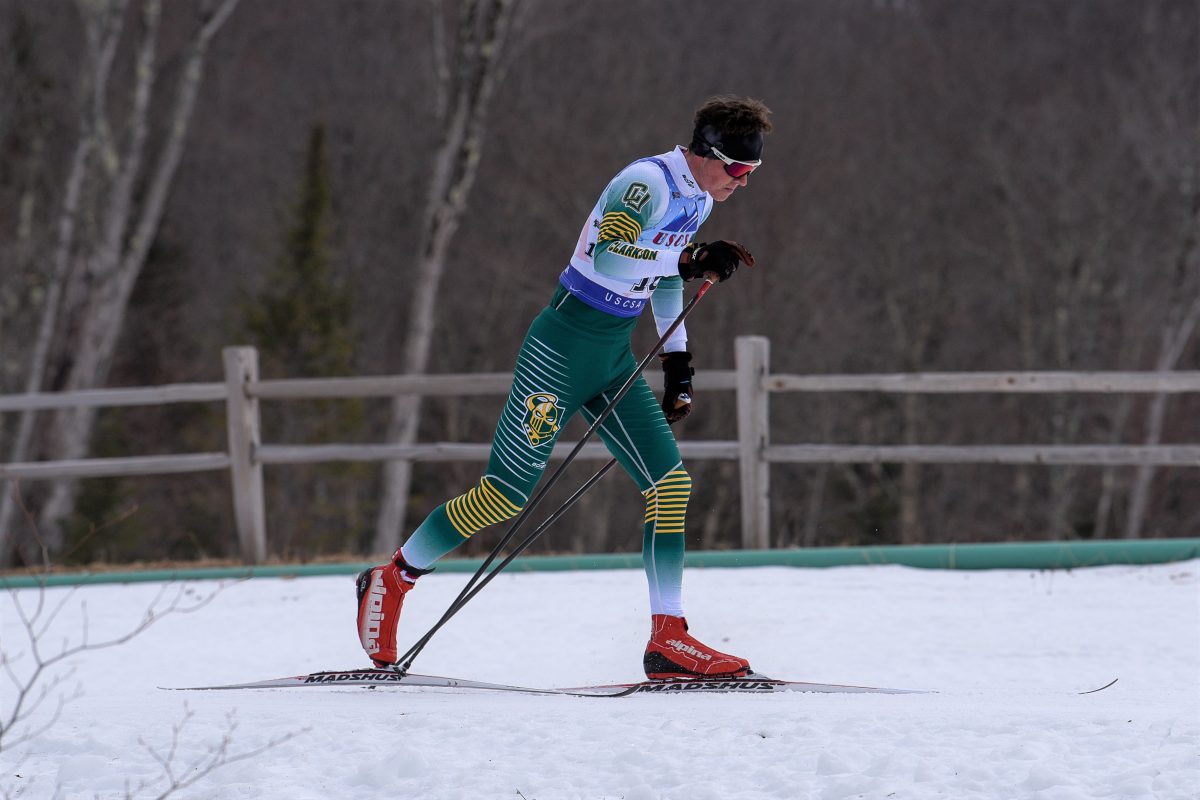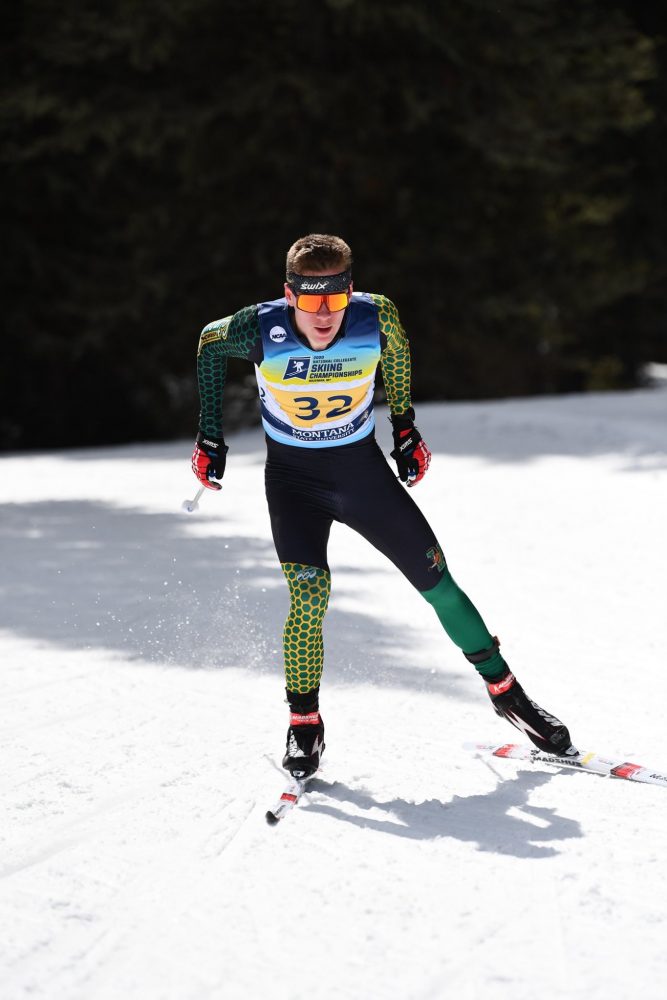How important is the mental aspect of racing? At nordic sport’s highest level, it can make the difference between winning and losing – in skiing but perhaps even more so in biathlon, which has the added pressure of rifle shooting.
With that in mind, the U.S. Olympic Committee (USOC) assigned psychologist Sean McCann to work with the biathlon team in the leadup to the Olympics. So far, he has been to three weekends of World Cup racing, and become a fixture on the team, joking around at the dinner table even if he’s serious in sessions with the athletes.
More than just allowing him to get to know the athletes, he believes that working with them on the World Cup will set up their success at the Olympic Games in Sochi in less than a month.
“I work for the Olympic Committee, so one of my missions is to help athletes perform well at the Games,” McCann explained in an interview at the finish line of a World Cup race in Ruhpolding, Germany, this weekend. “But I really don’t think you can sneak up on success at the Games – you have to have already figured it out at the World Cups. You’ve seen it in every sport. Every once in a blue moon you see someone have a peak performance at the Games, but usually not. Usually it’s in line with what they’ve been able to show.”
It’s McCann’s first time working with the team, who had previously been linked up with a different USOC psychologist. This is the first time, though, that one has become embedded with the team and traveled so extensively with them.
That’s kind of McCann’s gig.
“I was a bike racer, a long time ago, before and during graduate school,” McCann said. So naturally, when he saw that the USOC was advertising research assistantships, he was intrigued. He took a break from graduate school and took one of the positions, and then joined the organization full-time in 1991. He’s been there ever since, working with a variety of teams; he says he considers himself mainly a summer-sports person.
This winter, McCann is still working with a few sliding-sports athletes, mostly as a holdover from previous USOC assignments. Mostly, he’ll be traveling with the biathlon team this winter, and he’ll be with them in Sochi for the Olympics.
Here’s the rest of what he told us this weekend.
FasterSkier: You’re new to biathlon, so…. how has that been going?
Sean McCann: It’s been great. I worked with precision shooting for over 20 years, so I have known shooting. But they take a lot longer to set up for each shot and take each shot! So that’s been eye-opening for me, what’s possible and what’s necessary in biathlon. There’s some similarities in terms of the challenges of pressure shooting, but the element of the clock ticking down, is just a really new dimension. It’s been enjoyable to work with these guys and these situations.
FS: What was the main thing you worked on with the precision shooters?
SM: There’s a lot of thought control. They have almost unlimited time to take the shot, set up the shot, and re-set up the shot. It’s making good decisions and having really good control of focus. So that’s somewhat transferrable. But with the precision shooters there’s a lot more pressure in the finals, where there’s a specific time limit. So having a process for executing each shot is really important. That, again, is fairly transferable.
FS: Is it a similar target size, or do biathletes have more leeway? Forgive us for not knowing much about precision shooting.
SM: These guys have more leeway. For a prone match in precision rifle, a 60-shot match, 600 is not unusual at all, 60 10’s. And then they actually go to decimals of tens. But it’s the same with 50 meters, Anschutz rifles, some people shoot Lapua ammunition. So it’s a lot of similar things. But there’s no bolt action, there’s no clips. It’s single-shot loading each time.
FS: So there’s a lot more process in biathlon. Is that something that can actually help in focusing?
SM: Yeah. In a way, having a rhythm almost prevents decision-making, which is helpful sometimes. You get into more of an athletic rhythm and movement, and it makes it potentially a little bit more automatic.
FS: One of the things that’s really unique about biathlon is how variable it is – you can have a great race and then be 90th the next day, even to a greater extent than in other sports. How do you help people with that challenge?
SM: I thought shooting was the most volatile sport that I’ve worked with. When top of our top swimmers have an off day, that means that instead of a gold medal and a world record, it’s a silver medal. If you have a bad day in shooting, you’re not on the first page anymore. But if you don’t have a good day in biathlon, you aren’t even on the second page! It’s the most volatile sport that I’ve worked with, because there’s so many pieces. And it’s all or nothing. A couple of split bullets out, that’s 40 places different.
It’s been interesting to see that a lot of veterans on the team have learned through trial and error that being resilient, letting it go, allowing you expect good things to happen the next day – it’s absolutely essential. Or else you’re not ready for success when you have the opportunity. You come in clean, to the range, with good skis, good fitness, when two days before you finished out of the money. It’s a constant struggle. When you’re fit and you’ve worked so hard to get the fitness, and then you have a couple of rough things that happen, it’s very hard. The whole staff feels it.
I’m someone who gets really engaged in the performance, and gets greedy for the performance just like the athletes. So I understand that frustration really well, what it’s like when you know it was there. It was there for the taking and it almost happened, but nobody knows it.
That’s for sure something we’ve been working on, to help people stay up, stay positive, have good expectancies. For me, the big thing is preparing for the good things to happen. I’m not so worried about dealing with a bad thing. Yes, it’s important to let stuff go, but it’s more important that they’re ready for good things to happen, and that’s not always easy.
FS: Are you working with these guys primarily on shooting, or are you having to learn a lot about the endurance racing side as well?
SM: I think a lot is on the shooting, because that’s the more obviously mental piece. But I’ve worked a lot with distance runners. So the mentality of the perfectionist endurance athlete, I know that. And some of the challenges of maintaining that volume of training and intensity of training, just all that time. Life issues that come up, dealing with injuries and fitness, and all that stuff.
Luckily, with such a terrific staff, the athletes have a lot of trust in training plans and all that. So I’ve seen the [overtraining] issue a lot more in other disciplines, particularly marathon runners, that more is always better. This group of athletes is really smart, and they really trust their coaches. So that eliminates a lot of those sorts of challenges, mostly.
FS: Are you working mostly one-on-one, or some group work?
SM: It’s mostly one-on-one. Some sports we do more team sessions, but here, although everybody’s doing the same thing, everybody’s strategies, plans, and issues are pretty singular. And they’ve been doing it for a long time. So it’s hard to find a level or topic of discussion that makes sense for everybody.
FS: In individual sports, how important is team chemistry, and what about this team?
SM: There’s actually some research that shows that team chemistry is more important in individual sports than in team sports. In part because team sports facilitates team building, and individual sports can work against it.
It has been wonderful to see how sensitive and actively considerate these athletes are to other people. I’ve worked with a lot of other winter sports that travel together for long periods of time and end up hating each other by the end of the season. This group, there’s a lot of strong personalities, different personalities, but there’s really a lot of effort put in to making life easier for one another, and that’s a big reason why it’s so much fun working with this team.
Chelsea Little
Chelsea Little is FasterSkier's Editor-At-Large. A former racer at Ford Sayre, Dartmouth College and the Craftsbury Green Racing Project, she is a PhD candidate in aquatic ecology in the @Altermatt_lab at Eawag, the Swiss Federal Institute of Aquatic Science and Technology in Zurich, Switzerland. You can follow her on twitter @ChelskiLittle.



